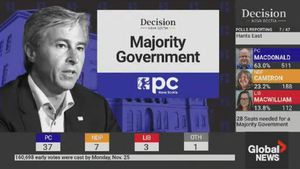Manchester City manager Pep Guardiola found himself at the center of controversy recently after remarks made during a post-match press conference sparked outrage related to the sensitive topic of self-harm. Following City's dramatic 3-3 draw against Feyenoord, where they squandered a commanding three-goal lead, Guardiola was asked about visible scratches on his face. His lighthearted response, which included the phrase "I want to harm myself," drew significant backlash for being inappropriate and dismissive of issues surrounding mental health.
During the press conference, Guardiola was initially questioned about the scratches, which he attributed to his own fingernail. He demonstrated this action with his hands, which led him to jest about wanting to hurt himself before laughing and leaving the room. This comment was taken poorly by many, especially as it referenced self-harm—a serious subject affecting countless individuals.
Realizing the potential impact and offense caused by his words, Guardiola later released a statement clarifying his intentions. "I was caught off guard with a question at the end of a press conference last night about a scratch which had appeared on my face and explained it was caused by my sharp fingernail," he explained. The statement continued, "My answer was in no way intended to make light of the very serious issue of self-harm. I know many people struggle with mental health issues every day, and I would like to highlight resources such as the Samaritans hotline for those who need help."
The timing of Guardiola's comments couldn’t have been worse. The draw against Feyenoord marked the continuation of City’s troubling form, having lost five games consecutively, making this one of the toughest stretches Guardiola has faced since he took charge of the club. After the match, midfielder Ilkay Gundogan elaborated on the team's struggles, stating, "Sometimes you will struggle regardless of your opponent. Even when you’re controlling the game, things can turn dramatically."
City had been cruising to victory, up 3-0 with just 15 minutes left to play before conceding three goals to the Dutch side. This incident not only underscored the team’s on-field problems but also amplified concerns about Guardiola's off-field comments during emotionally charged times.
The fallout from Guardiola's unintentional insensitivity also spurred discussions about mental health awareness. Many commentators emphasized the importance of language surrounding such issues and noted how significant figures like Guardiola should be cautious with their words, even when joking. Mental health organizations were quick to respond, urging the need for sensitive discussions around mental health, particularly from high-profile personalities.
To add to the backdrop of this situation, Manchester City’s performance has drawn heavy criticism. With their Premier League positions slipping and their performance lacking the usual spark, the pressure on Guardiola is mounting. Many fans have taken to social media to voice their frustrations, focusing on both the team’s play and their manager's recent comments.
Looking forward, City faces another challenging fixture against league leaders Liverpool. With their string of poor performances looming large, Guardiola must refocus his squad and play it smart, not just tactically, but also in how he communicates with the press and fans. The significance of his words extends beyond mere jokes; they carry weight and influence, especially when mental health is on the table.
Guardiola’s experience serves as a reminder of the pitfalls of casual remarks made under pressure, especially on sensitive topics. His clarified statement reflects a growing awareness of the need for sensitivity among public figures, particularly those whose reach extends far beyond the pitch. Even as City struggles for form, the hope remains for both their recovery and respectful discourse around mental health issues to continue flourishing.



